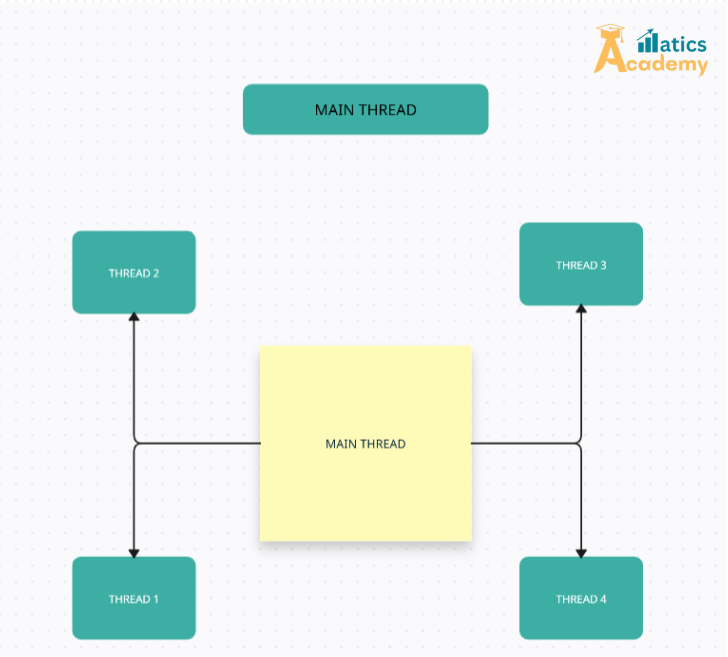Python’s main thread is a crucial concept when dealing with multi-threading thread main in Python. Understanding it is essential for efficiently writing programs that utilize threading for concurrent execution. This article dives deep into the main thread, covering its importance, behavior, and use cases, complete with coding examples.

What is the Main Thread in Python?
The main thread is the default thread that runs when a Python program starts. It is responsible for executing the main portion of your code. When additional threads are created, they are considered child threads of the main thread.
Key Characteristics of the Main Thread
- Default Thread: The main thread starts automatically when you execute a Python script.
- Lifecycle: The program ends when the main thread finishes execution, but it waits for all non-daemon threads to complete.
- Thread Identification: You can identify the main thread using the
threadingmodule.
Example: Identifying the Main Thread
import threading
main_thread = threading.main_thread()
print(f"Main Thread Name: {main_thread.name}")
Managing the Main Thread/(Thread Main in python)
Python’s threading module provides tools to manage and interact with threads. The main thread can spawn other threads, wait for them to complete, or terminate them under specific conditions.
Subtopics
1. Creating Threads from the Main Thread
You can create and start new threads from the main thread using the threading.Thread class.
Example:
import threading
def print_numbers():
for i in range(5):
print(f"Number: {i}")
# Creating a thread
thread = threading.Thread(target=print_numbers)
thread.start()
# Main thread continues
print("Main thread is running...")
2. Daemon Threads and the Main Thread
Daemon threads are background threads that automatically terminate when the main thread exits.
Example:
import threading
import time
def background_task():
while True:
print("Running in the background...")
time.sleep(1)
# Create a daemon thread
daemon_thread = threading.Thread(target=background_task, daemon=True)
daemon_thread.start()
print("Main thread exiting...")
3. Joining Threads in the Main Threa
The join() method ensures that the main thread waits for a child thread to complete before continuing.
Example:
import threading
import time
def task():
print("Task started")
time.sleep(2)
print("Task completed")
# Start a thread
thread = threading.Thread(target=task)
thread.start()
# Wait for the thread to finish
thread.join()
print("Main thread resuming...")4. Main Thread Exceptions
Unhandled exceptions in the main thread cause the program to terminate. Proper exception handling ensures robustness.
Example:
try:
print("Executing main thread...")
1 / 0 # Trigger an exception
except ZeroDivisionError as e:
print(f"Handled exception: {e}")
5. Main Thread vs. Other Threads
The main thread has special privileges, such as the ability to block program termination until non-daemon threads finish.
Example:
import threading
def worker():
print("Worker thread running")
# Non-daemon thread
non_daemon = threading.Thread(target=worker)
non_daemon.start()
print("Main thread waiting for non-daemon thread...")
6. Use Cases for the Main Thread
- Coordinating Multi-threaded Tasks: The main thread can serve as a controller for complex multi-threaded programs.
- User Interaction: Typically handles input/output while child threads manage background tasks.
Mini Project(Thread main in python): Thread Management in Main Thread
This project demonstrates how the main thread manages the creation and synchronization of multiple child threads.
Mini Project Code(Thread main in python)
import threading
def download_data(data):
print(f"Downloading {data}")
# Main thread creates and manages child threads
data_files = ["file1", "file2", "file3"]
threads = []
for file in data_files:
thread = threading.Thread(target=download_data, args=(file,))
threads.append(thread)
thread.start()
# Main thread waits for all child threads to complete
for thread in threads:
thread.join()
print("All downloads completed.")
Interview Questions for “TCS”
1.What is the thread main in a Python program?
Answer: The main thread is the first thread to run when the program starts and is responsible for managing execution flow.
2.Can the main thread create other threads?
Answer: Yes, the main thread can create and manage child threads in a program.
3.How does the main thread interact with other threads?
Answer: The main thread can start other threads and wait for them to finish using join().
4.What happens when the main thread finishes execution?
Answer: When the main thread finishes execution, the program exits, terminating any remaining child threads.
5.Can the main thread be explicitly stopped in Python?
Answer: No, the main thread cannot be explicitly stopped. It finishes when its execution ends.
